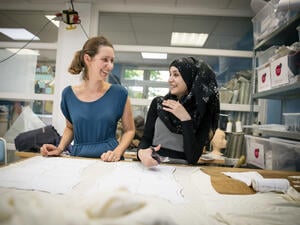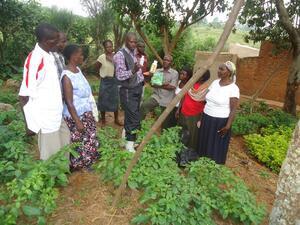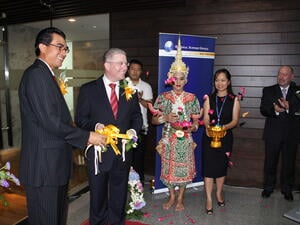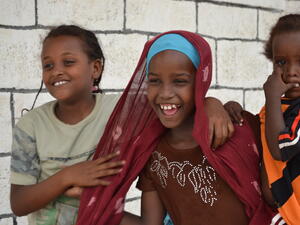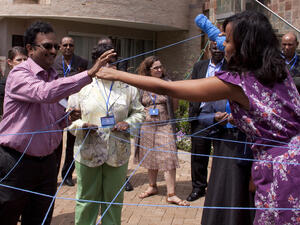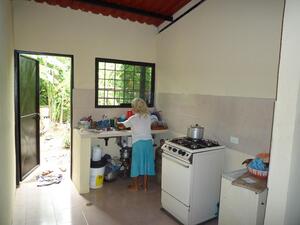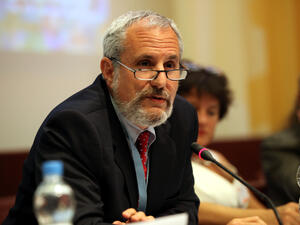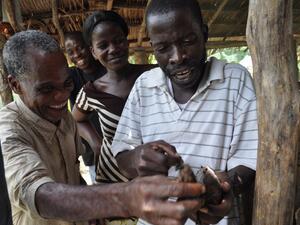South Africa's social workers learn to work with refugees
South Africa's social workers learn to work with refugees

As part of the training in Polokwane, social workers had to close their eyes, have coloured dots stuck on their foreheads and form groups without speaking, a game which illustrated the deeply ingrained concepts of belonging and exclusion.
POLOKWANE, South Africa (UNHCR) - "Stand in a circle and close your eyes. You are not allowed to talk during this exercise," says the facilitator while her partner sticks coloured dots - mostly red or blue, with only one yellow - on the participants' foreheads.
"Now open your eyes and form groups," she says. Nobody tells the participants to follow the colour codes, but they invariably do. Without a mirror and after some gesturing and laughing, they separate into red and blue groups. The woman with the yellow dot is left outside, bewildered.
"How did it feel for the 'yellow' woman to be ostracised?" asks the facilitator in the ensuing discussion. "What does that teach us about feelings of belonging or exclusion, about how we perceive others?"
Mmone Moletsane, UNHCR's senior community services assistant, and Claudia Serra from Lawyers for Human Rights are conducting a training session for 20 social workers in Polokwane, the capital of Limpopo province in South Africa. The workshop focuses on the rights, entitlements and other issues relating to refugee children in the country.
"I have not come across refugee problems in my 11 years of service," says Francine, one of the participants. "But I want to know what to do when such a case comes up."
Her fellow participants are just as eager to learn about refugees and unaccompanied minors - knowledge they will need when the government opens a refugee reception office in this province soon.
It has been 10 years since the South African miracle took place, metamorphosing from a pariah state to a fully democratic and respected member of the international community. Building democracy was a complex task and required many structures to be rebuilt or adapted for its own citizens.
At the same time, the flow of migration reversed. South Africa went from producing refugees to receiving them, with people from the region's conflict-torn countries trickling south to this economic powerhouse.
For UNHCR, the first years after the advent of democracy in South Africa were dedicated to legal work. The country acceded to the 1951 Geneva Convention and other international legal instruments and put asylum legislation and corresponding government structures in place.
Unlike all other African countries, South Africa does not have any refugee camps. Asylum seekers and refugees live in urban regions and survive largely without assistance. If they need support, they approach local government structures. Thus capacity-building among key professionals has become one of UNHCR's major objectives in South Africa.
The strategic plan was conceived in 2003 with the compilation of the Social Workers Guide, "Working with Foreign Children". The manual was launched on World Refugee Day in June this year, when UNHCR's capacity-building scheme entered its second phase: training South Africa's civil servants to deal with the refugee influx.
To date, 15 training sessions have been held in five of the nine South African provinces, reaching out to a total of 440 social workers. Roughly 5 percent of all social workers in the country have undergone the training, which will undoubtedly have a sustainable impact on the way refugees and asylum seekers are being looked after.
After the training, all participants have two months to write an eight-page assignment. Only then will they receive a certificate. This is part of a scheme called Continuing Professional Development, which social workers are required to do each year.
In Polokwane, the training covers many issues: the more legalistic refugee definitions and South African law as well as practical problems social workers may be confronted with. Which papers are needed for what? What rights do refugee children have when it comes to education, social problems or health care issues?
South Africans are not used to seeing many foreigners in their country and many feel unsettled by their presence. Legal and illegal migrants, temporary residents and refugees are very often confused by the media and the general public. They are accused of abusing the social system, taking away jobs and bringing crime and disease to the country.
Moletsane and co-facilitator Serra know very well that social workers are part of local society. As much as they are trained to assist and give support, they share the same values and prejudices as the population in general. Therefore the training session also tackles the emotional side of being a refugee.
"As social workers, you need to understand refugee children so that stereotypes do not get in the way of your professional delivery," Moletsane says at the seminar.
During the afternoon tea break, the social workers discuss practical cases. Puleng says she is currently dealing with a foreign orphan. The boy's parents died of HIV/AIDS and now relatives from his home country want to take him back. Over steaming cups of South African Rooiboos tea, the women start asking all the right questions: Is the child a refugee? What is his status? Would he be endangered if he returned home? What is in the best interest of the boy?
Moletsane smiles to herself. As the seminar draws to a close, she sees that the participants have understood the issues at stake. Mission accomplished in Polokwane. She can move on to Cape Town next week.
By Melita H. Sunjic
UNHCR South Africa

